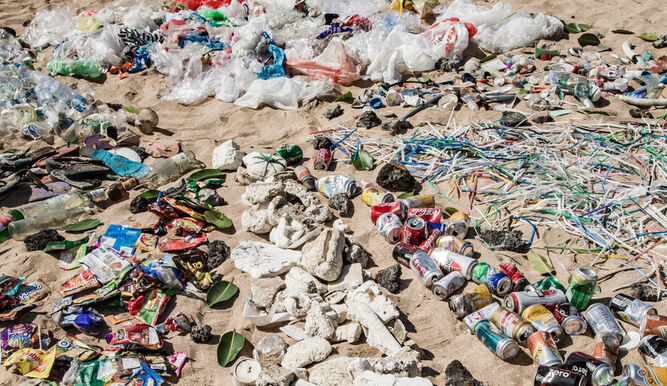ENVIRONMENT: Every meter of world coastline will hold 50 kg of plastic in 20 years

In less than 20 years the level of pollution will be such that on every meter of coastline in the world there will be, on average, about 50 kilograms of plastic garbage.
The projections represent a new environmental alert emerging from a study by the United Nations Environment Program (UNEP ).
Currently, the different plastic products are equivalent to 85% of the waste that reaches the sea, at the rate of between eight million and 10 million tons per year. By 2040, the figures will increase to reach between 23 million and 37 million tons per year, the study points out as a prelude to the 26th United Nations Conference on Climate Change(COP26), which will be held from October 31 in Glasgow.
So much plastic in the oceans will affect all marine species, including corals, birds, reptiles, and mammals linked to saltwater ecosystems. Each will face risks of suffocation, poisoning, behavioral disorders or starvation, due to the fragments of plastic, or microplastics, that end up entering the food chain.
In the case of humans, plastic waste and its chemical components could cause sequelae such as hormonal changes, developmental disorders, reproductive abnormalities, or diseases such as cancer.
People ingest plastics in water, fish and shellfish, or through common salt, the research says. The low prices of raw materials based on fossil fuels, compared to sources of materials produced by recycling; the lack of articulation in the management of plastic waste, and the lack of consensus on global solutions to significantly reduce the consumption of plastics, are the most critical problems that lead to the negative projections on marine pollution.
Neither are initiatives such as the elimination of the use of plastic bags or single-use plastic products sufficient for the moment. According to the report “Single-use plastics – a route to sustainability”, by Environment, in 2018 there were 99 countries that had introduced some legislation to reduce or eliminate the use of plastic material, mainly bags from supermarkets and shops.
Pandemic effects
Three years later, the situation has been exacerbated due to the pandemic, a health crisis that has forced the use of billions of masks, gloves, medical waste, and take-out packaging. Plastic consumption has risen so much that many countries have seen their recycling systems collapse.
In Panama, research is being carried out on microplastic on the coasts and waters of the country and two recent laws are in force that promote the reduction of the use of plastic bags and single-use plastic products, such as swabs, clothing covers for laundry services, packaging of eggs, and sticks for candies.





